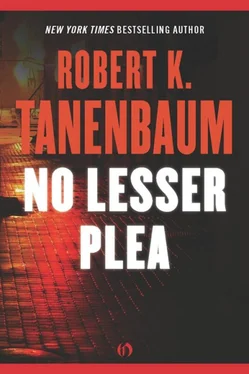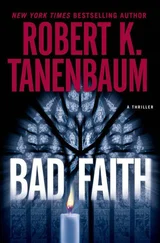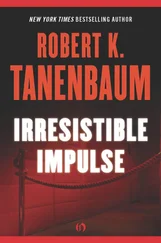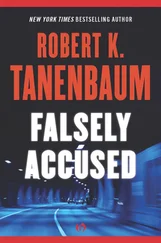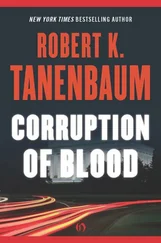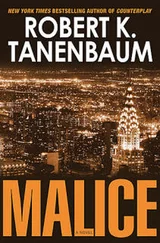Robert Tanenbaum - No Lesser Plea
Здесь есть возможность читать онлайн «Robert Tanenbaum - No Lesser Plea» весь текст электронной книги совершенно бесплатно (целиком полную версию без сокращений). В некоторых случаях можно слушать аудио, скачать через торрент в формате fb2 и присутствует краткое содержание. Год выпуска: 2011, ISBN: 2011, Издательство: Open Road Integrated Media, Жанр: Криминальный детектив, на английском языке. Описание произведения, (предисловие) а так же отзывы посетителей доступны на портале библиотеки ЛибКат.
- Название:No Lesser Plea
- Автор:
- Издательство:Open Road Integrated Media
- Жанр:
- Год:2011
- ISBN:978-1-4532-0994-3
- Рейтинг книги:4 / 5. Голосов: 1
-
Избранное:Добавить в избранное
- Отзывы:
-
Ваша оценка:
- 80
- 1
- 2
- 3
- 4
- 5
No Lesser Plea: краткое содержание, описание и аннотация
Предлагаем к чтению аннотацию, описание, краткое содержание или предисловие (зависит от того, что написал сам автор книги «No Lesser Plea»). Если вы не нашли необходимую информацию о книге — напишите в комментариях, мы постараемся отыскать её.
No Lesser Plea — читать онлайн бесплатно полную книгу (весь текст) целиком
Ниже представлен текст книги, разбитый по страницам. Система сохранения места последней прочитанной страницы, позволяет с удобством читать онлайн бесплатно книгу «No Lesser Plea», без необходимости каждый раз заново искать на чём Вы остановились. Поставьте закладку, и сможете в любой момент перейти на страницу, на которой закончили чтение.
Интервал:
Закладка:
Guma said, “No doc, I never had nothin’ like that before.”
“Good. Now please go on. You say you saw the judge change into a giant chicken?”
“Yeah, right, more like a rooster. So he started squawkin’ and then, and then I heard this voice, like it was coming from the ceiling, sayin’, ‘I will turn you into, ah, bread crumbs.’ ”
“Bread crumbs?”
“Yeah, you know, like the rooster was gonna eat me?”
“Ah, yes, I see.”
“So I started making a fuss, y’know? So here I am.” He laughed.
“Yes. Well, Lennie, I think that will be all for today. You will have to see another doctor, but I think what’s troubling you is clear enough.”
“Doc, will I have to go back to the trial?” asked Guma, in as nervous a tone as he could manage without cracking up.
“No, of course not. It would be inhuman. No, Lennie, you’re in good hands now.”
“Aw, thanks, doc, you’re a saint!” exclaimed Guma.
Werner beamed. This was why he had gone to med school. That, and power.
The next day Guma sat in the dayroom of Bellevue’s lock-up ward, reading the Post and feeling grumpy. He had breakfasted on what tasted like warm, damp clay and he hadn’t had a beer or a cigar in more than twenty-four hours, a violation, in his view, of the constitutional safeguards against cruel and unusual punishment. And he was no closer to getting the goods on the docs. He had seen Werner, who was a dingbat, but they already knew that.
He looked up from his paper and glanced around the dayroom. He saw a couple dozen people, a cross section of male New York. Some guys talking to the air. One or two jerking off. A guy peeing in the corner. Most of them sitting and watching TV or playing cards. Nothing you couldn’t see any day in Times Square or on the subway. It seemed only happenstance could explain why these men were here and not on the southbound IRT.
Guma noticed a small, skinny old man in a shiny dark suit wandering through the crowd. He carried a notebook and a stack of file folders. Guma watched him approach a large black man who was arguing with the ceiling. The old man argued with the ceiling for a while, too. The madman paused in his ravings and the two of them had a brief conversation. They smiled and shook hands. The black man went over and sat down in front of the TV. The old man spoke with some of the other inmates in a cheerful and conversational manner. Then he came over to where Guma was sitting and pulled up a chair.
Close up the man looked even older than he had across the room: a thin fringe of silver hair around a speckled scalp; a sallow, wrinkled face; a large, lumpy nose that looked as if it had been broken at some time in the remote past; bad, yellow teeth; and deeply sunken brown eyes with heavy grayish pouches beneath them. But the eyes were sharp and bright.
“Well, young man, how do you feel today?” he asked. Unlike the psychiatrists he had met previously, this guy seemed genuinely interested in the answer. He had a slight German accent.
Guma gave him the Ganser syndrome cover story. The old man listened carefully, occasionally making a note with a fountain pen in a cheap spiral-bound notebook. He said “mmm-ahh” from time to time, to keep the story moving. When Guma had finished, the old man sighed and pushed his gold-rimmed glasses up on his forehead. He held out his hand.
“Perlsteiner.”
Guma shook hands and gave his cover name. The old man’s grip was surprisingly strong. Dr. Perlsteiner looked through his files and pulled one out. He read it and let out a little snorting laugh.
“Ach, so we have Ganser syndrome again. Ganser syndrome. ” He made it sound like the name of a cartoon character on Saturday morning TV.
Perlsteiner looked at Guma sharply, but his eyes still held an amused twinkle. “Mister Trevio,” he said, “you would be surprised how little real mental illness there is in the world. And of that, how little is associated with criminal behavior. Irrationality, we have, plenty. And evil, oh my, we have enough, more than enough of that. But the poor crazy people: They suffer, you understand? They can barely take care of themselves. Plot a crime? Nonsense! They cannot do it. Oh, perhaps, in a frenzy they hurt someone, yes, but as I say, this is rare.
“You know, Mister Trevio, when I was much younger, I had the opportunity to observe, at close hand, a great deal of criminal behavior, people being murdered and tortured, robbed, and so on. And afterward, when people said, ‘This was madness, this was insanity,’ I would say, ‘No, it was not. Evil, surely. Hate and greed, yes, lust for power, yes, fear, perhaps. But not insane. This is a libel on the poor madmen.’
“But, you know, they don’t listen. They wish to make a medical thing of evil. Madness is also such a useful metaphor, for that which we would rather not face, eh? So. I am didactic again. Forgive me. Now, you, my dear man-I see here by your record-wished for some money, heh? And you took it. Very sane. And you were caught, but you do not wish to pay for your crime, heh? Also, very sane.”
Perlsteiner capped his pen, put it in his breast pocket, and got slowly to his feet. “So. I have examined you. You are sane as bread. I will write my report, which I am sure will be ignored, as were the others. But no matter.” He looked around the dayroom and gestured to the inmates.
“You see, I make my examinations here, instead of in my office. Doctor Werner gives me a very small office, which is very inconvenient also. And damp. Much like a cell, you understand? So I do my examining in the open ward. We did the same in the Geisteskrankheitshaus in Vienna. And at Treblinka, of course.”
Perlsteiner made to go and then began to pat and poke all his pockets. “My eyeglasses …?”
“On your forehead,” said Guma.
Dr. Perlsteiner laughed delightedly and adjusted his glasses. “So they are. Thank you very much. Carl Jung was always doing the same. Look, let me give you some advice. We don’t see the delusions characteristic of florescent schizophrenia situationally, with no prior history of the disease. Only in literature. In real life, once you got them, they don’t go away so easy, you understand? Roosters! Ha! Good God!”
Guma watched the old man walk away, humming. He smiled and strolled over to the payphone, put in some coins and dialed.
“V.T.? Good, you’re in. Time to spring me. I think I got a lead.”
The next morning Karp was back in his office, trying without much energy to plow through the piles of paperwork accumulated in his absence. Frank Gelb had dropped by, smiling, to say he had been appointed to the bench and was leaving immediately for a vacation in Europe before assuming his new duties. Karp was acting chief as of that morning.
Karp stared glumly at a set of large computer-generated charts laid out on his desk. They told a worse-than-usual story. Of the fifteen hundred cases arraigned by Karp’s assistants every week, almost seventy percent were removed from the courts immediately, either through plea bargains or skips after release. Of those that got past arraignment, only three percent were ever brought to a full trial, the rest being plea bargained away.
The most depressing figure, however, was the conviction rate. Karp got out the folder that held several sheets of graph paper on which he had plotted the trial rates and the conviction rates in the months since Bloom took over. He added the appropriate points. In Garrahy’s last month, ten percent of the cases passing through the Criminal Courts Bureau reached trial; eighty percent of the trials had ended in conviction, usually for the top count. This past month it had dropped below thirty-five percent. The golden age is gone, thought Karp, ring in the age of brass. Or toilet paper.
Читать дальшеИнтервал:
Закладка:
Похожие книги на «No Lesser Plea»
Представляем Вашему вниманию похожие книги на «No Lesser Plea» списком для выбора. Мы отобрали схожую по названию и смыслу литературу в надежде предоставить читателям больше вариантов отыскать новые, интересные, ещё непрочитанные произведения.
Обсуждение, отзывы о книге «No Lesser Plea» и просто собственные мнения читателей. Оставьте ваши комментарии, напишите, что Вы думаете о произведении, его смысле или главных героях. Укажите что конкретно понравилось, а что нет, и почему Вы так считаете.
